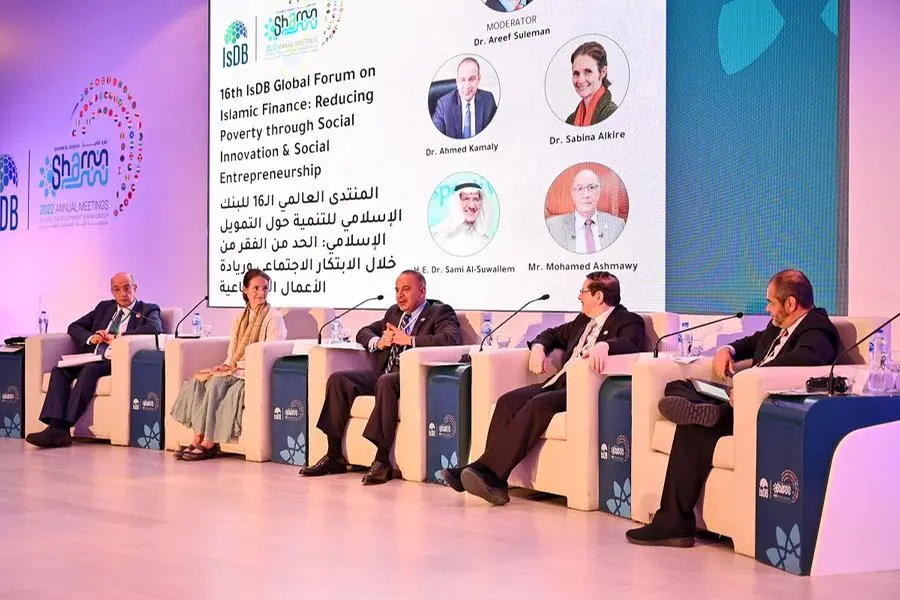PHOTO
Sharm El-Sheikh, Arab Republic of Egypt: The Islamic Development Bank Institute organized the 16th Islamic Development Bank Global Forum on Islamic Finance under the theme "Poverty Reduction through Social Innovation and Social Entrepreneurship", on the sidelines of the annual meetings of the IsDB Group. The meetings were launched yesterday in Sharm El-Sheikh in the Arab Republic of Egypt, on 1 June, and are scheduled to continue until 4 June, under the patronage of His Excellency President Abdel Fattah El-Sisi.
During the first session, H.E. Dr. Muhammad Al Jasser, Chairman of the Board of Directors of IsDB Group, said that the economic crisis that resulted from COVID-19 increased poverty and inequality rates and the number of poor people worldwide. More than half of the world’s population was categorized as poor following the pandemic. "The economic situation has reached its worst. One out of every three member countries of IsDB is living in poverty,” he said. He also pointed out that the battle against poverty has always been top-priority objective in IsDB’s partnerships with member countries and various institutions.
"The pandemic prompted us to reinforce our efforts. We have looked into the best kind of cooperation with member countries to reduce poverty, and expanded the partnership with the Oxford Initiative. We also presented an integrated initiative with more development projects,” he added.
Al Jasser said that the Group is happy to see some countries able to reduce their poverty rates and mitigate the negative effect of the pandemic. “Several experiences have helped the affected countries achieve positive results. There is a global consensus that the problems the world is dealing are difficult for governments to handle alone. Accordingly, the efforts of financing institutions, development agencies and civil society must be combined through innovative solutions that enhance social responsibility,” he noted.
During the discussions, Dr. Ahmed Kamali, Deputy Minister of Planning and Economic Development, said that Egypt's experience was focused on monitoring as a way of measuring poverty. He added, "What Egypt is doing in terms of building roads, improving water and services, developing education, enhancing health services, and developing and expanding drainage is implementing serious projects that contribute to reducing poverty rates."
Kamali added that the efforts Egypt made over the past five years focused on the aspect of multidimensional poverty, explaining that the issue of poverty is linked to several other issues, including education.
Kamali alluded to the data revealed in the latest human development report on Egypt. He explained that in terms of development, everyone should get equal access to education, health services and others, as the focus cannot be only on poverty in terms of incomes.
He shed light on Egypt's development efforts and projects, such as road and infrastructure projects, as well as other projects related to water and sanitation, and quality education, all of which have a significant impact on multidimensional poverty.\
For her part, Mrs. Sabina Alkire, Director of the Oxford Poverty and Human Development Initiative (OPHI), said that Egypt is a leading country in setting standards for dealing with multidimensional poverty. In addition, many countries have benefited from these standards. "The initiative measures poverty in 109 countries. We found that two thirds of the poor live in homes that do not have educated women, and if one third of the world’s population is poor, then the situation in Egypt represents 1 to 20,” she said.
Mr. Mohamed Ashmawy, Acting Vice President of Nasser Social Bank of Egypt, said that the bank’s work involves measuring poverty in various aspects of life in terms of income, life, sports and education. He continued: “We are working to combat the effects of poverty, and we provide financing based on gender. We provide funding to half a million women to help them manage their micro enterprises. We work together with civil society, and government institutions and bodies, and we cooperate with Haya Karema (Dignified Life) Initiative."
For his part, Dr. Sami Al-Suwailem, Acting Director of the Institute, said, "Islamic finance has a great impact on the lives of member countries, hence the focus on social innovation and responsibility. A large portion of Islamic finance goes to combating poverty, and while the original goal was to avoid usury, the institute set out to establish foundations for many commercial aspects that help economic growth. Social development has been achieved through many initiatives that positively improve lives.”
In the second session, Sahba Sobhani, Director of the Istanbul International Center for Private Sector Development (IICPSD) of the United Nations Development Program (UNDP), said that the notion of Islamic finance is in the core of the Islamic methodology and reaching social and economic goals with institutions. He stressed that there is a need to re-maximize investment and have societal creativity as well as continuous expansions of innovative solutions to develop individuals and reduce poverty.
Mr. Ayman El-Sabaa, founder of Shamsya Organization for Health Development in Egypt, explained that when the challenges of complex economic problems are tackled, innovative solutions become necessary. “In the field of health, we believe that dealing with health problems requires us to be creative when providing health care to citizens. We have developed many creative solutions to many problems through Shamseya, which is mainly aimed at helping poor patients”.
At the conclusion of the forum, IsDB Group launched a training course on Islamic finance aimed at enhancing awareness of its concept in the member countries of the Bank and other countries around the world.




















